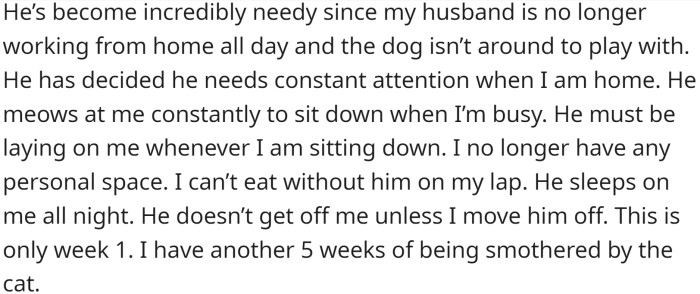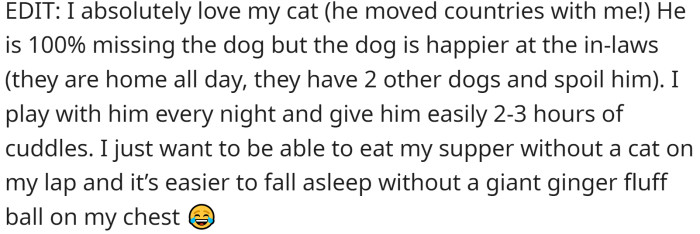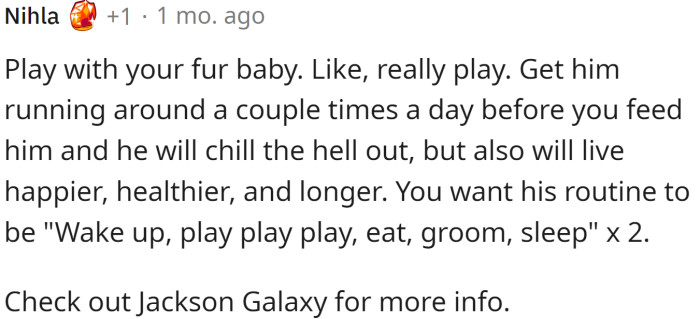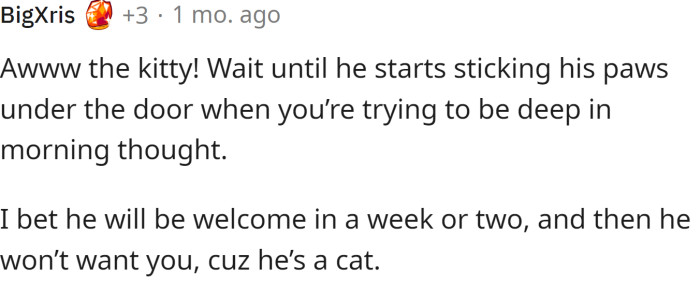Woman Regrets Letting Her Husband and Dog Leave for Six Weeks Because She Became the Sole "Victim" of Their Needy Cat
Cats are often known as independent and aloof creatures, but they can still be quite needy and clingy. They are often very affectionate with their owners and can become very attached to them.
They may follow their owners around the house, meowing for attention or snuggling up for a cuddle. Cats can also experience separation anxiety if their owners are away for an extended period of time.
Today, we have one of those stories. OP realized the extent of her mistake today.
Her husband is away for a short work placement in a different country, and her dog will be with the in-laws until just before he returns. With only herself and the cat at home, the cat has become incredibly needy since her husband is no longer working from home all day, and the dog isn’t around to play with.
He meows at her constantly for attention and must lay on her whenever she is sitting down. She no longer has any personal space.
She can’t eat without him on her lap, and he sleeps on her all night. He doesn’t get off her unless she moves him off.
This is only week one, and she has another five weeks of being smothered by the cat.
OP says:

OP realized the extent of her mistake today. Her husband is away for a short work placement in a different country, and her dog will be with the in-laws until just before he returns.

With only her and the cat at home, the cat has become incredibly needy since her husband is no longer working from home all day, and the dog isn’t around to play with.

The Psychological Impact of Pet Ownership
Owning pets can significantly impact emotional well-being, but it also comes with responsibilities.
Dr. Rachel Adams, an animal behaviorist at the University of Washington, notes that pets often become emotional support systems for their owners.
However, when the dynamics shift, as in this case, the owner may experience feelings of neglect or abandonment.
OP posted an edit:

The cat needs to burn some energy and have a routine

This is so true :)

Research shows that pets can help reduce feelings of loneliness and anxiety, but they also require time and attention.
When one partner is preoccupied with other responsibilities, it can lead to feelings of resentment from the pet owner.
Understanding this dynamic is essential for creating a balanced environment for both pets and owners.
Sounds about right:

The pandemic has been difficult for all of us, but it has been especially challenging for cats. For many cats, the pandemic meant their humans were home all the time, allowing them to spend more quality time with their owners than ever before.
Cats became accustomed to their owners being around, snuggling up with them, playing with them, and receiving lots of love and attention. But now, as we start to return to a more “normal” lifestyle, cats are having a hard time adjusting.
Cats are creatures of habit, and they don’t like change. When their owners are suddenly gone all the time, cats can become anxious, depressed, and even aggressive.
They may start to act out, meowing loudly, scratching furniture, or even urinating outside of their litter box. They may also become clingy, following their owners around the house and getting upset when they leave.
Cats need attention too. Well, unless they don't want it. Who could tell?

Redditors can relate...

The Importance of Shared Responsibilities
Shared responsibilities in pet care can strengthen relationships and enhance emotional connections.
Studies indicate that when partners collaborate on pet care, it fosters a sense of teamwork and shared purpose.
This collaborative dynamic can improve emotional satisfaction within relationships.
Cats hate changes...

Cats will often show their neediness in other ways, too, such as by being overly vocal, excessively rubbing against their owners, or even climbing on top of them. Cats will also demand a certain amount of attention from their owners and may become frustrated or withdrawn if they don't receive the affection they crave.
Overall, cats may appear aloof, but they can certainly be clingy and needy too. Owners should ensure they provide their cats with plenty of love and attention to keep them happy and content.
Practical strategies for shared pet care include creating a schedule that outlines each partner's responsibilities.
This can help both partners feel equally invested in the pet's well-being.
Additionally, setting aside time for joint activities with the pet can enhance bonding and alleviate feelings of neglect.
Navigating the Challenges of Pet Ownership
Pet ownership can come with unexpected challenges that require effective communication.
Research from the Journal of Social Psychology highlights that couples who communicate openly about their expectations regarding pet care are better able to navigate conflicts.
Understanding differing perspectives on pet responsibilities can lead to more harmonious living situations.
Psychological Analysis
This situation highlights the importance of balance in pet ownership and relationship dynamics.
When one partner feels overwhelmed, it can lead to feelings of resentment and neglect. It's crucial for partners to communicate their needs and work collaboratively to ensure that both the pet and their relationship thrive.
Analysis generated by AI
Analysis & Alternative Approaches
In summary, pet ownership can have profound emotional impacts, but it also requires shared responsibilities and effective communication.
Creating a balanced approach to pet care can enhance emotional satisfaction for both partners.
By engaging in open dialogue and collaborative care, couples can navigate the challenges of pet ownership more effectively.



